Business Law Assignment 1: Civil, Criminal Law & Contracts, 2019
VerifiedAdded on 2023/03/30
|7
|1263
|491
Homework Assignment
AI Summary
This assignment delves into the fundamental aspects of business law, contrasting civil and criminal law, explaining the concept of 'burden of proof,' and exploring contract law principles. It addresses the differing standards of proof in civil and criminal cases, providing examples of each in a business context. The solution also discusses the rights of an arrested person and the advantages and disadvantages of civil litigation, differentiating between mediation and arbitration. Furthermore, it analyzes various scenarios involving contract validity, breach of contract, and remedies, applying legal principles to practical situations. The document concludes with relevant references, and similar solved assignments and past papers are available on Desklib to assist students in their studies.
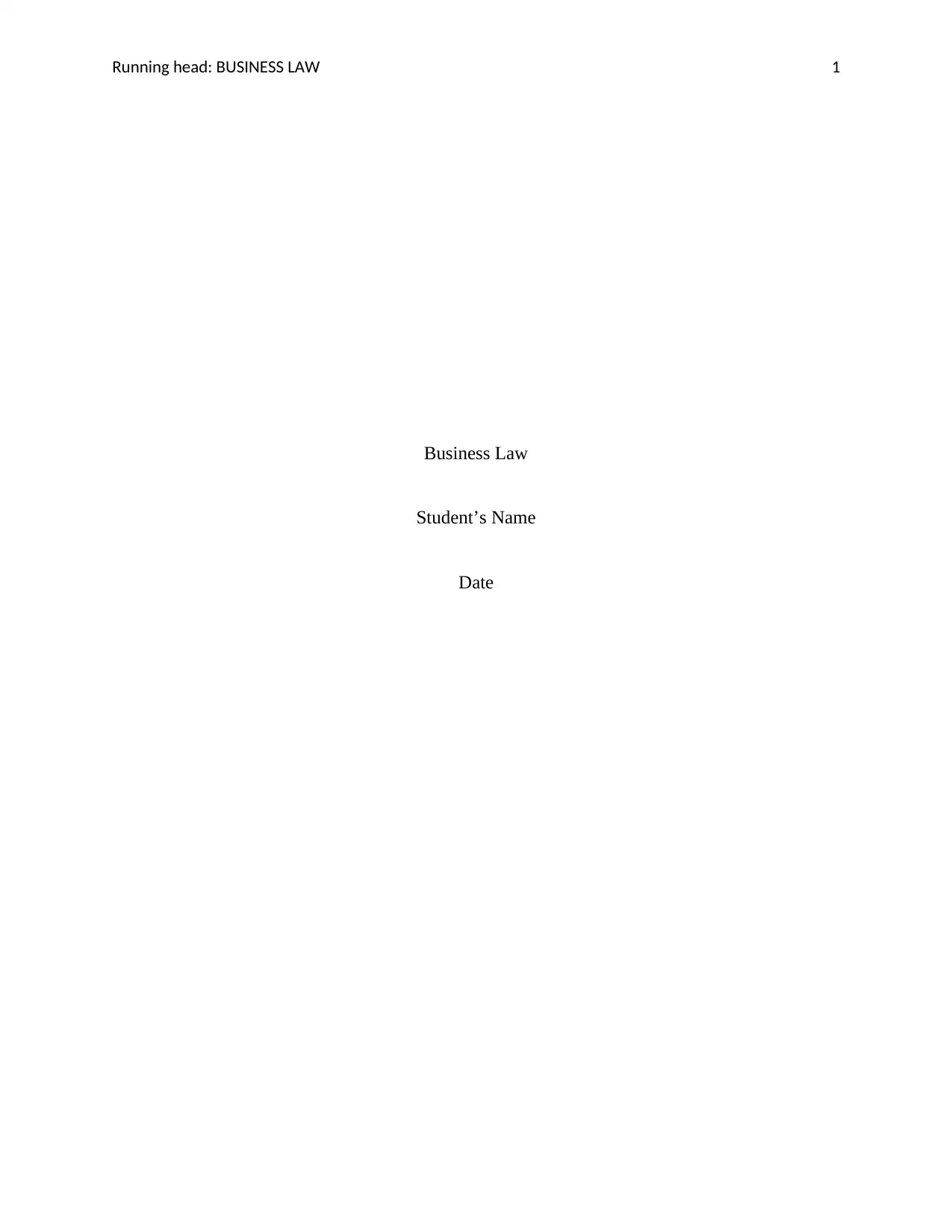
Running head: BUSINESS LAW 1
Business Law
Student’s Name
Date
Business Law
Student’s Name
Date
Paraphrase This Document
Need a fresh take? Get an instant paraphrase of this document with our AI Paraphraser
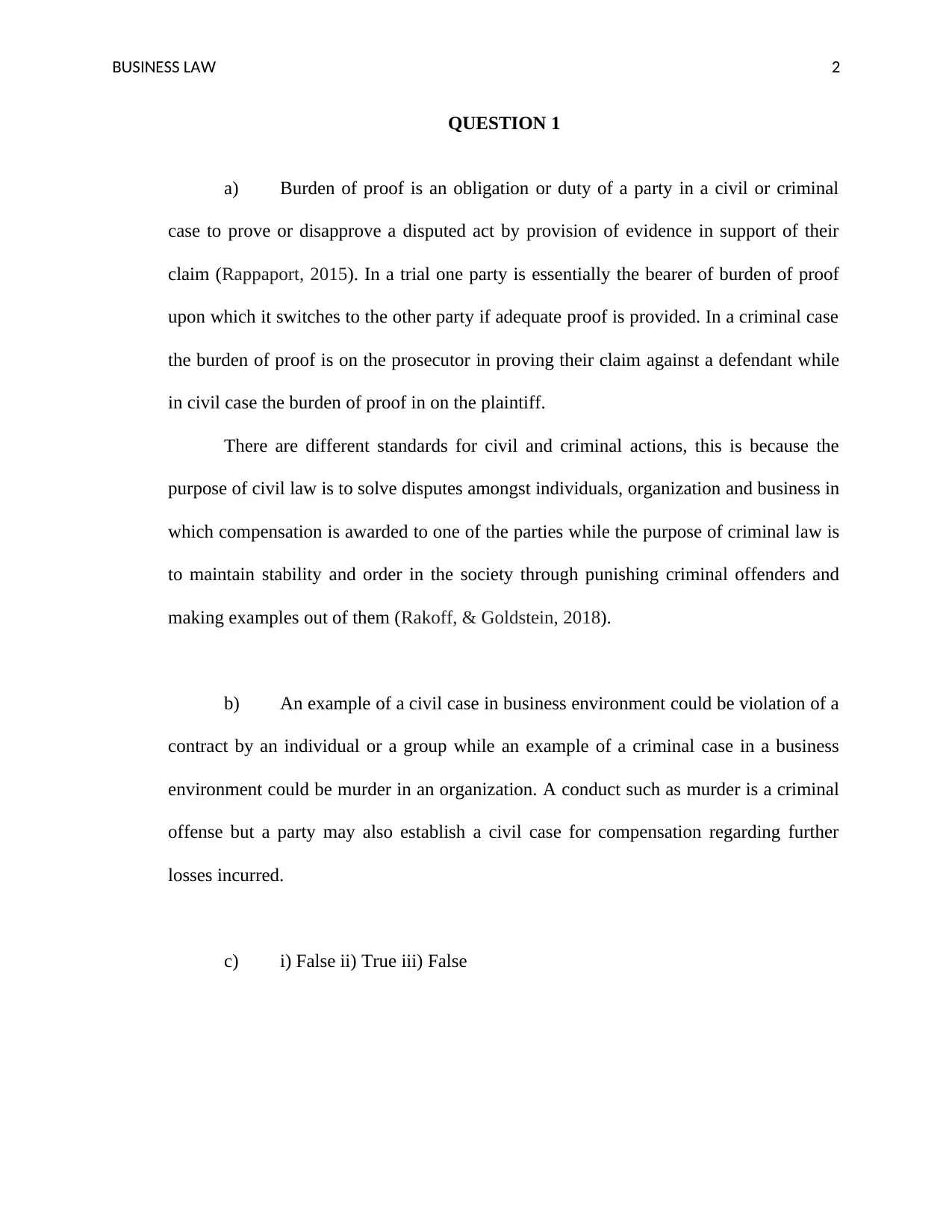
BUSINESS LAW 2
QUESTION 1
a) Burden of proof is an obligation or duty of a party in a civil or criminal
case to prove or disapprove a disputed act by provision of evidence in support of their
claim (Rappaport, 2015). In a trial one party is essentially the bearer of burden of proof
upon which it switches to the other party if adequate proof is provided. In a criminal case
the burden of proof is on the prosecutor in proving their claim against a defendant while
in civil case the burden of proof in on the plaintiff.
There are different standards for civil and criminal actions, this is because the
purpose of civil law is to solve disputes amongst individuals, organization and business in
which compensation is awarded to one of the parties while the purpose of criminal law is
to maintain stability and order in the society through punishing criminal offenders and
making examples out of them (Rakoff, & Goldstein, 2018).
b) An example of a civil case in business environment could be violation of a
contract by an individual or a group while an example of a criminal case in a business
environment could be murder in an organization. A conduct such as murder is a criminal
offense but a party may also establish a civil case for compensation regarding further
losses incurred.
c) i) False ii) True iii) False
QUESTION 1
a) Burden of proof is an obligation or duty of a party in a civil or criminal
case to prove or disapprove a disputed act by provision of evidence in support of their
claim (Rappaport, 2015). In a trial one party is essentially the bearer of burden of proof
upon which it switches to the other party if adequate proof is provided. In a criminal case
the burden of proof is on the prosecutor in proving their claim against a defendant while
in civil case the burden of proof in on the plaintiff.
There are different standards for civil and criminal actions, this is because the
purpose of civil law is to solve disputes amongst individuals, organization and business in
which compensation is awarded to one of the parties while the purpose of criminal law is
to maintain stability and order in the society through punishing criminal offenders and
making examples out of them (Rakoff, & Goldstein, 2018).
b) An example of a civil case in business environment could be violation of a
contract by an individual or a group while an example of a criminal case in a business
environment could be murder in an organization. A conduct such as murder is a criminal
offense but a party may also establish a civil case for compensation regarding further
losses incurred.
c) i) False ii) True iii) False
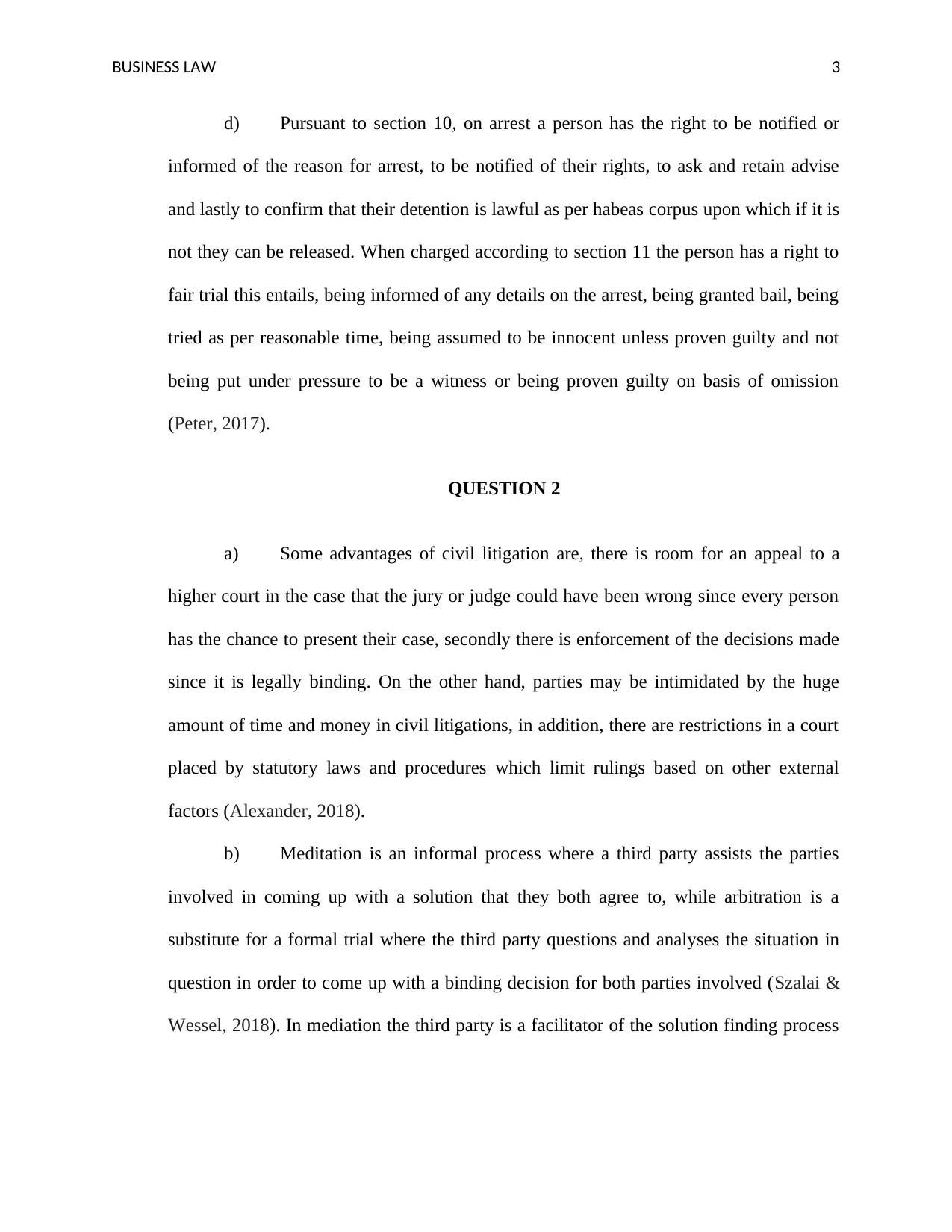
BUSINESS LAW 3
d) Pursuant to section 10, on arrest a person has the right to be notified or
informed of the reason for arrest, to be notified of their rights, to ask and retain advise
and lastly to confirm that their detention is lawful as per habeas corpus upon which if it is
not they can be released. When charged according to section 11 the person has a right to
fair trial this entails, being informed of any details on the arrest, being granted bail, being
tried as per reasonable time, being assumed to be innocent unless proven guilty and not
being put under pressure to be a witness or being proven guilty on basis of omission
(Peter, 2017).
QUESTION 2
a) Some advantages of civil litigation are, there is room for an appeal to a
higher court in the case that the jury or judge could have been wrong since every person
has the chance to present their case, secondly there is enforcement of the decisions made
since it is legally binding. On the other hand, parties may be intimidated by the huge
amount of time and money in civil litigations, in addition, there are restrictions in a court
placed by statutory laws and procedures which limit rulings based on other external
factors (Alexander, 2018).
b) Meditation is an informal process where a third party assists the parties
involved in coming up with a solution that they both agree to, while arbitration is a
substitute for a formal trial where the third party questions and analyses the situation in
question in order to come up with a binding decision for both parties involved (Szalai &
Wessel, 2018). In mediation the third party is a facilitator of the solution finding process
d) Pursuant to section 10, on arrest a person has the right to be notified or
informed of the reason for arrest, to be notified of their rights, to ask and retain advise
and lastly to confirm that their detention is lawful as per habeas corpus upon which if it is
not they can be released. When charged according to section 11 the person has a right to
fair trial this entails, being informed of any details on the arrest, being granted bail, being
tried as per reasonable time, being assumed to be innocent unless proven guilty and not
being put under pressure to be a witness or being proven guilty on basis of omission
(Peter, 2017).
QUESTION 2
a) Some advantages of civil litigation are, there is room for an appeal to a
higher court in the case that the jury or judge could have been wrong since every person
has the chance to present their case, secondly there is enforcement of the decisions made
since it is legally binding. On the other hand, parties may be intimidated by the huge
amount of time and money in civil litigations, in addition, there are restrictions in a court
placed by statutory laws and procedures which limit rulings based on other external
factors (Alexander, 2018).
b) Meditation is an informal process where a third party assists the parties
involved in coming up with a solution that they both agree to, while arbitration is a
substitute for a formal trial where the third party questions and analyses the situation in
question in order to come up with a binding decision for both parties involved (Szalai &
Wessel, 2018). In mediation the third party is a facilitator of the solution finding process
⊘ This is a preview!⊘
Do you want full access?
Subscribe today to unlock all pages.

Trusted by 1+ million students worldwide
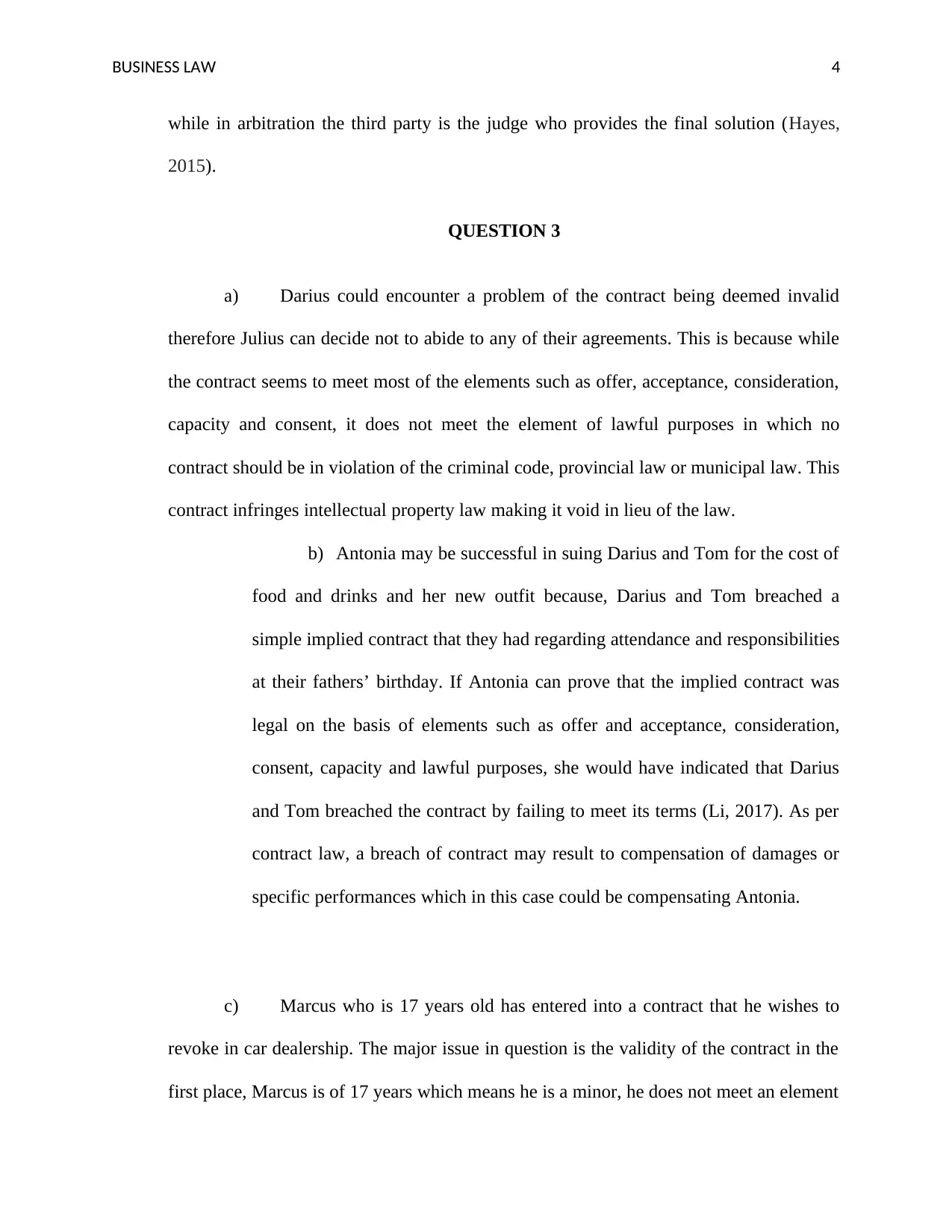
BUSINESS LAW 4
while in arbitration the third party is the judge who provides the final solution (Hayes,
2015).
QUESTION 3
a) Darius could encounter a problem of the contract being deemed invalid
therefore Julius can decide not to abide to any of their agreements. This is because while
the contract seems to meet most of the elements such as offer, acceptance, consideration,
capacity and consent, it does not meet the element of lawful purposes in which no
contract should be in violation of the criminal code, provincial law or municipal law. This
contract infringes intellectual property law making it void in lieu of the law.
b) Antonia may be successful in suing Darius and Tom for the cost of
food and drinks and her new outfit because, Darius and Tom breached a
simple implied contract that they had regarding attendance and responsibilities
at their fathers’ birthday. If Antonia can prove that the implied contract was
legal on the basis of elements such as offer and acceptance, consideration,
consent, capacity and lawful purposes, she would have indicated that Darius
and Tom breached the contract by failing to meet its terms (Li, 2017). As per
contract law, a breach of contract may result to compensation of damages or
specific performances which in this case could be compensating Antonia.
c) Marcus who is 17 years old has entered into a contract that he wishes to
revoke in car dealership. The major issue in question is the validity of the contract in the
first place, Marcus is of 17 years which means he is a minor, he does not meet an element
while in arbitration the third party is the judge who provides the final solution (Hayes,
2015).
QUESTION 3
a) Darius could encounter a problem of the contract being deemed invalid
therefore Julius can decide not to abide to any of their agreements. This is because while
the contract seems to meet most of the elements such as offer, acceptance, consideration,
capacity and consent, it does not meet the element of lawful purposes in which no
contract should be in violation of the criminal code, provincial law or municipal law. This
contract infringes intellectual property law making it void in lieu of the law.
b) Antonia may be successful in suing Darius and Tom for the cost of
food and drinks and her new outfit because, Darius and Tom breached a
simple implied contract that they had regarding attendance and responsibilities
at their fathers’ birthday. If Antonia can prove that the implied contract was
legal on the basis of elements such as offer and acceptance, consideration,
consent, capacity and lawful purposes, she would have indicated that Darius
and Tom breached the contract by failing to meet its terms (Li, 2017). As per
contract law, a breach of contract may result to compensation of damages or
specific performances which in this case could be compensating Antonia.
c) Marcus who is 17 years old has entered into a contract that he wishes to
revoke in car dealership. The major issue in question is the validity of the contract in the
first place, Marcus is of 17 years which means he is a minor, he does not meet an element
Paraphrase This Document
Need a fresh take? Get an instant paraphrase of this document with our AI Paraphraser
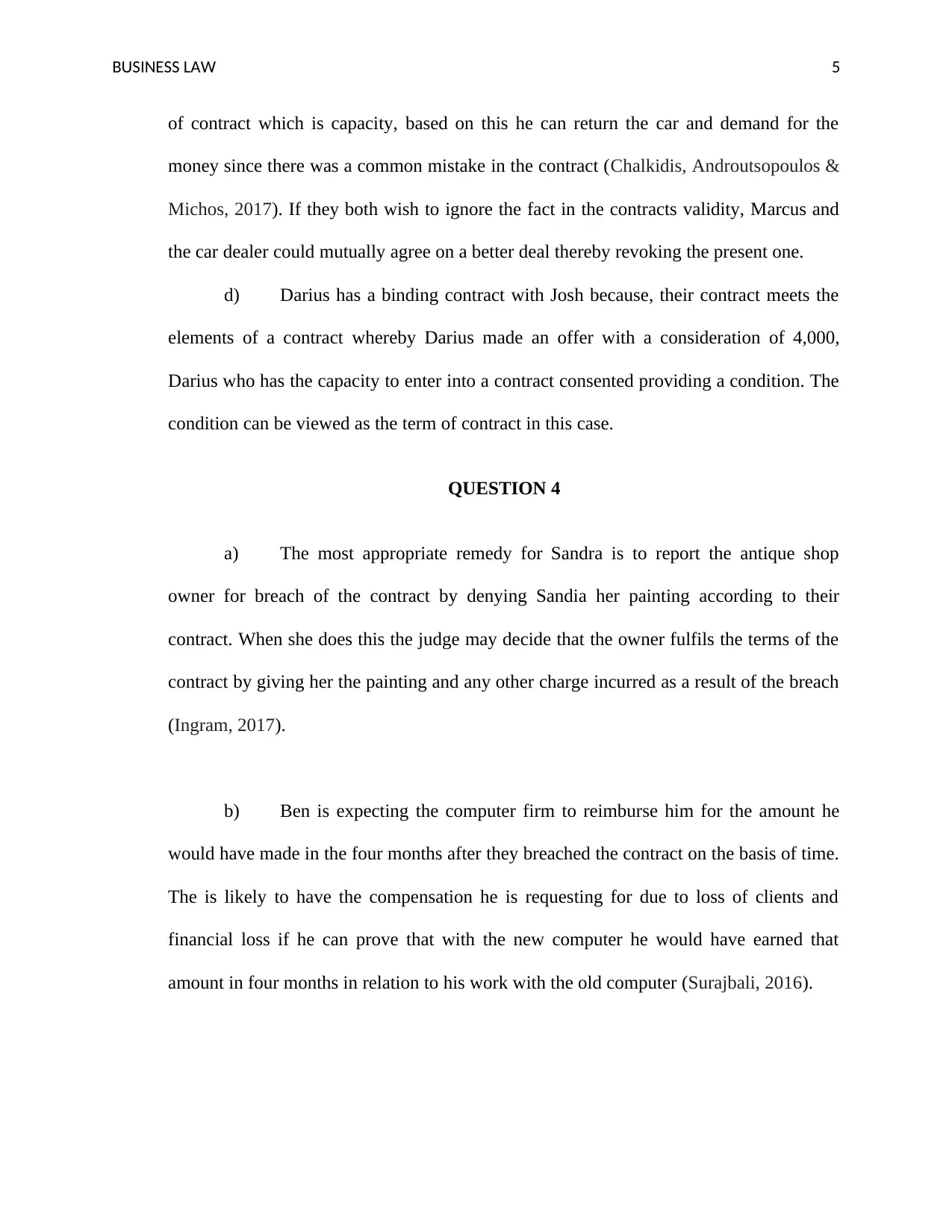
BUSINESS LAW 5
of contract which is capacity, based on this he can return the car and demand for the
money since there was a common mistake in the contract (Chalkidis, Androutsopoulos &
Michos, 2017). If they both wish to ignore the fact in the contracts validity, Marcus and
the car dealer could mutually agree on a better deal thereby revoking the present one.
d) Darius has a binding contract with Josh because, their contract meets the
elements of a contract whereby Darius made an offer with a consideration of 4,000,
Darius who has the capacity to enter into a contract consented providing a condition. The
condition can be viewed as the term of contract in this case.
QUESTION 4
a) The most appropriate remedy for Sandra is to report the antique shop
owner for breach of the contract by denying Sandia her painting according to their
contract. When she does this the judge may decide that the owner fulfils the terms of the
contract by giving her the painting and any other charge incurred as a result of the breach
(Ingram, 2017).
b) Ben is expecting the computer firm to reimburse him for the amount he
would have made in the four months after they breached the contract on the basis of time.
The is likely to have the compensation he is requesting for due to loss of clients and
financial loss if he can prove that with the new computer he would have earned that
amount in four months in relation to his work with the old computer (Surajbali, 2016).
of contract which is capacity, based on this he can return the car and demand for the
money since there was a common mistake in the contract (Chalkidis, Androutsopoulos &
Michos, 2017). If they both wish to ignore the fact in the contracts validity, Marcus and
the car dealer could mutually agree on a better deal thereby revoking the present one.
d) Darius has a binding contract with Josh because, their contract meets the
elements of a contract whereby Darius made an offer with a consideration of 4,000,
Darius who has the capacity to enter into a contract consented providing a condition. The
condition can be viewed as the term of contract in this case.
QUESTION 4
a) The most appropriate remedy for Sandra is to report the antique shop
owner for breach of the contract by denying Sandia her painting according to their
contract. When she does this the judge may decide that the owner fulfils the terms of the
contract by giving her the painting and any other charge incurred as a result of the breach
(Ingram, 2017).
b) Ben is expecting the computer firm to reimburse him for the amount he
would have made in the four months after they breached the contract on the basis of time.
The is likely to have the compensation he is requesting for due to loss of clients and
financial loss if he can prove that with the new computer he would have earned that
amount in four months in relation to his work with the old computer (Surajbali, 2016).
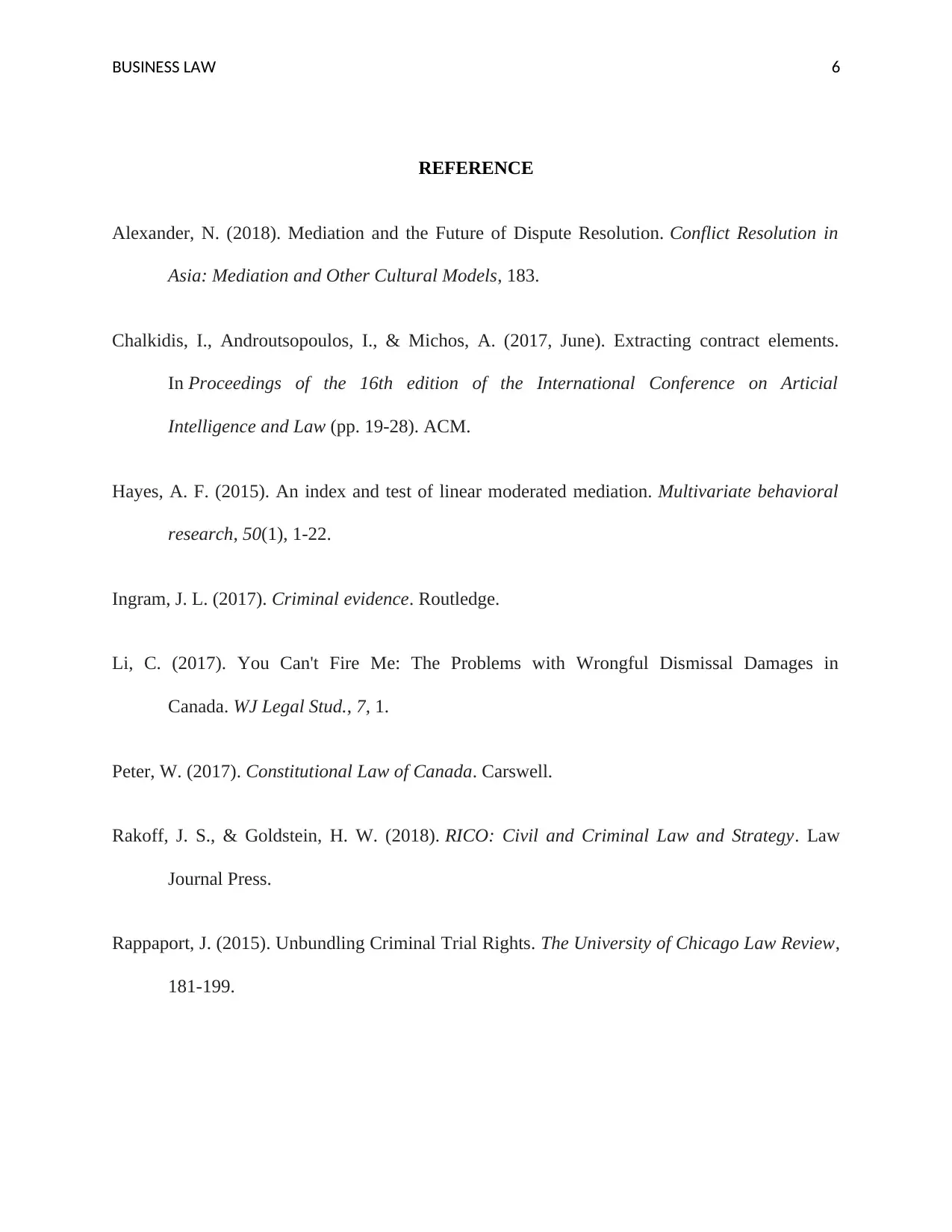
BUSINESS LAW 6
REFERENCE
Alexander, N. (2018). Mediation and the Future of Dispute Resolution. Conflict Resolution in
Asia: Mediation and Other Cultural Models, 183.
Chalkidis, I., Androutsopoulos, I., & Michos, A. (2017, June). Extracting contract elements.
In Proceedings of the 16th edition of the International Conference on Articial
Intelligence and Law (pp. 19-28). ACM.
Hayes, A. F. (2015). An index and test of linear moderated mediation. Multivariate behavioral
research, 50(1), 1-22.
Ingram, J. L. (2017). Criminal evidence. Routledge.
Li, C. (2017). You Can't Fire Me: The Problems with Wrongful Dismissal Damages in
Canada. WJ Legal Stud., 7, 1.
Peter, W. (2017). Constitutional Law of Canada. Carswell.
Rakoff, J. S., & Goldstein, H. W. (2018). RICO: Civil and Criminal Law and Strategy. Law
Journal Press.
Rappaport, J. (2015). Unbundling Criminal Trial Rights. The University of Chicago Law Review,
181-199.
REFERENCE
Alexander, N. (2018). Mediation and the Future of Dispute Resolution. Conflict Resolution in
Asia: Mediation and Other Cultural Models, 183.
Chalkidis, I., Androutsopoulos, I., & Michos, A. (2017, June). Extracting contract elements.
In Proceedings of the 16th edition of the International Conference on Articial
Intelligence and Law (pp. 19-28). ACM.
Hayes, A. F. (2015). An index and test of linear moderated mediation. Multivariate behavioral
research, 50(1), 1-22.
Ingram, J. L. (2017). Criminal evidence. Routledge.
Li, C. (2017). You Can't Fire Me: The Problems with Wrongful Dismissal Damages in
Canada. WJ Legal Stud., 7, 1.
Peter, W. (2017). Constitutional Law of Canada. Carswell.
Rakoff, J. S., & Goldstein, H. W. (2018). RICO: Civil and Criminal Law and Strategy. Law
Journal Press.
Rappaport, J. (2015). Unbundling Criminal Trial Rights. The University of Chicago Law Review,
181-199.
⊘ This is a preview!⊘
Do you want full access?
Subscribe today to unlock all pages.

Trusted by 1+ million students worldwide
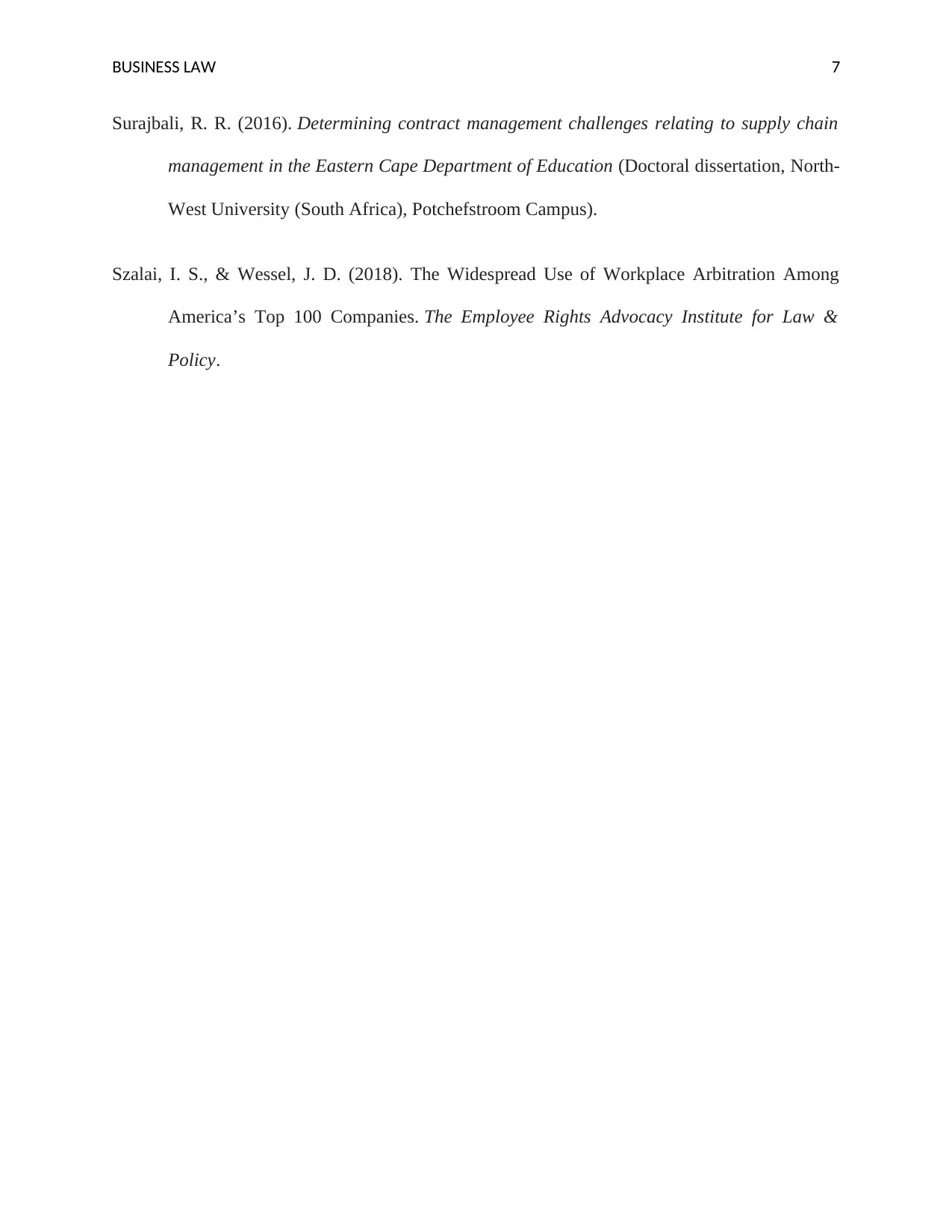
BUSINESS LAW 7
Surajbali, R. R. (2016). Determining contract management challenges relating to supply chain
management in the Eastern Cape Department of Education (Doctoral dissertation, North-
West University (South Africa), Potchefstroom Campus).
Szalai, I. S., & Wessel, J. D. (2018). The Widespread Use of Workplace Arbitration Among
America’s Top 100 Companies. The Employee Rights Advocacy Institute for Law &
Policy.
Surajbali, R. R. (2016). Determining contract management challenges relating to supply chain
management in the Eastern Cape Department of Education (Doctoral dissertation, North-
West University (South Africa), Potchefstroom Campus).
Szalai, I. S., & Wessel, J. D. (2018). The Widespread Use of Workplace Arbitration Among
America’s Top 100 Companies. The Employee Rights Advocacy Institute for Law &
Policy.
1 out of 7
Related Documents
Your All-in-One AI-Powered Toolkit for Academic Success.
+13062052269
info@desklib.com
Available 24*7 on WhatsApp / Email
![[object Object]](/_next/static/media/star-bottom.7253800d.svg)
Unlock your academic potential
Copyright © 2020–2026 A2Z Services. All Rights Reserved. Developed and managed by ZUCOL.





